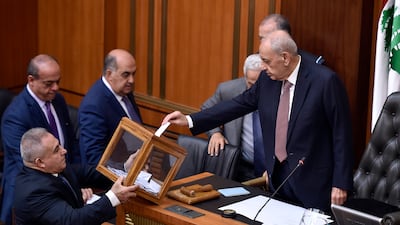The Lebanese Parliament on Thursday failed for a sixth time to elect the country’s next president as government vacuum rumbles on.
Blank votes again received the highest count, with 46, while independent MP Michel Moawad received 43. Parliament Speaker, Nabih Berri, set the seventh presidential session for next Thursday.
Two thirds of the vote in the 128-seat parliament is needed for a candidate to win in the first round, with an absolute majority required in subsequent rounds.
It was the second parliamentary session since the term of former president Michel Aoun ended in late October. It took 46 sessions, two and a half years and a series of political deals behind closed doors for Mr Aoun to be elected in 2016.
With a consensus candidate yet to emerge, the continuing deadlock on Thursday was expected. In Lebanon's confessional political system, the head of state is reserved for a Maronite Christian.
Mr Moawad, whose father Rene served as president for 18 days in 1989 before being assassinated, has consistently been backed by a largely anti-Hezbollah bloc, which includes the Lebanese Forces — the parliament’s largest party.
But he is seen as too divisive to attract the necessary majority needed to become president.
Many of Lebanon's largest parties, including Iran-backed Hezbollah, Mr Berri's Amal Movement and the Free Patriotic Movement, which Mr Aoun founded, have yet to announce who they are backing.
Thursday's session featured the first vote cast for Suleiman Frangieh, who is regarded as one of the main presidential contenders and is close to Hezbollah.
Mr Aoun's son-in-law Gebran Bassil, who now heads the FPM, is also close to Hezbollah and is believed to have presidential ambitions although to date he has not declared his candidacy.
Lebanon is currently entrenched in a governing vacuum. In the event that there is no head of state, the government takes on presidential powers. But Prime Minister Najib Mikati’s cabinet has been in caretaker status for months since the parliamentary elections in May and as a result, has extremely limited powers.
Mr Mikati this week referred to his “historical relationship" with Mr Frangieh and said a president must be elected soon.
Hezbollah is a powerful armed group and political party, backed by Iran, and holds significant sway in Lebanon. Hassan Nasrallah, its secretary general, last week called for "a president who will not stab the [Hezbollah] in the back and will not conspire against it and will not sell it".


